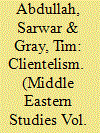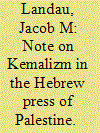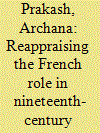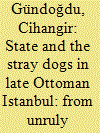|
|
|
Sort Order |
|
|
|
Items / Page
|
|
|
|
|
|
|
| Srl | Item |
| 1 |
ID:
159014


|
|
|
|
|
| Summary/Abstract |
This article examines clientelism in Iraq as a case study of one form of corruption. Iraq is an unusual case of corruption, because a key feature of Iraq's corrupt environment is an institutionalised factional political system based on sectarian quotas. The article explores the many links between clientelism and political factionalism, discussing whether clientelism arose because of factionalism, or whether factionalism merely determines the ways that clientelism currently operates in Iraq. Using fieldwork data, the findings show there are two distinct levels of clientelism in Iraq, both of which are linked to political factions: the individual level and the organisational level. First, clientelism at the individual level entails the elites of many political factions regarding ‘money politics’ as a means of influence in Iraq/Kurdistan by buying people's affiliations and thereby governing people. Second, clientelism at the organisational level entails that the spoils of political office are shared out among the elites of the political factions in a proportionate fashion. The article concludes that clientelism is a form of political rather than economic corruption; and that while there may be some immediate value in clientelism, its long-term harm outweighs its short-term value.
|
|
|
|
|
|
|
|
|
|
|
|
|
|
|
|
| 2 |
ID:
159011


|
|
|
|
|
| Summary/Abstract |
The Sykes–Picot The Sykes-Picot Agreement is often cited as evidence of a Western conspiracy to carve up the Middle East and subordinate the Arabs. It is a prevalent view across the region, and has been a refrain repeated by critics. Yet very little is known of the far more significant conclusions of a Committee, formed by Maurice de Bunsen on the orders of the British government, which ascertained the options open to the Allies in 1915. Far from a nefarious conspiracy, the Committee came down in favour of a decentralised, ultimately independent region. The First World War compelled some revision of the original intent, but the essence of the Committee's conclusions remained intact throughout the war, and after. Conversely, Sir Mark Sykes repudiated the ‘agreement’ he had made with the French diplomat Picot, and substantial revisions were made to that temporary scheme. Yet it seems that ‘conspiracy sells’, and generations have colluded with the theme of perfidy to reinforce particular narratives, including, most recently, the Da´esh movement's claim to have ‘ended Sykes-Picot’.
|
|
|
|
|
|
|
|
|
|
|
|
|
|
|
|
| 3 |
ID:
159013


|
|
|
|
|
| Summary/Abstract |
Focusing on sport as an arena of struggle in the Israel/Palestine conflict, the current study traces, conceptually and historically, the way in which the Palestinian Authority in general, and Jibril Rajoub in particular, have shifted efforts toward the sporting arena in order to promote global awareness of the Palestinian case. In the current case study, the Palestinians were not successful at drawing attention to their political goals or in suspending Israel from Fédération Internationale de Football Association. However, their attempt emphasizes the ways in which conflicts had changed and the importance of images in the information age we live in. Conflicts today are very much battles of ideas and the information designed by the media. Alongside the military confrontations, an Image War is taking part in which each side tries to justifies its ideas, beliefs and actions.
|
|
|
|
|
|
|
|
|
|
|
|
|
|
|
|
| 4 |
ID:
159009


|
|
|
|
|
| Summary/Abstract |
This article examines the displacement of the majority of Crete's Muslim population after an upheaval led to the establishment of an autonomous regime on the island in 1898, following the military intervention by a coalition of European powers (Britain, France, Italy and Russia). By drawing a connection between Cretan topography and the type of intervention, I argue that the coalition's policies played a central role in Muslim emigration from the greatest Ottoman island. The article highlights the sectarian lens through which the European decision-makers regarded relations between the island's Christian and Muslim populations. In so doing, it makes a contribution to the history of European intervention in the Ottoman Empire. The final section offers a glimpse into the diminished Muslim minority under the autonomous regime, which was established after Abdülhamid II withdrew his soldiers from Crete, signifying de facto termination of Ottoman sovereignty on the island.
|
|
|
|
|
|
|
|
|
|
|
|
|
|
|
|
| 5 |
ID:
159016


|
|
|
|
|
| Summary/Abstract |
The 2015 Joint Comprehensive Plan of Action (JCPOA) provided a poignant example of how Iran successfully pursued a unique grand strategy that was established following, and had evolved since, the 1979 Revolution. As a result, Tehran was able to stifle attempts by Washington, DC to influence domestic Iranian affairs. In this context, this article argues that Iran's grand strategy juggled a commitment to the regime's revolutionary mantra, formed in 1979, and a pragmatic approach to pursuing national interests. This is accomplished by analyzing the foundation and evolution of Iran's grand strategy, and where the US fits in this dynamic. By focusing on the negotiations leading up to and the eventual signing of the JCPOA, this article sheds light on how Iran's grand strategy was formulated, what constitutes the main drivers and barriers to the strategy, and indeed how this manifested itself in the US–Iran relationship context.
|
|
|
|
|
|
|
|
|
|
|
|
|
|
|
|
| 6 |
ID:
159012


|
|
|
|
|
| Summary/Abstract |
This study analyzes how Kurdish women experience the violence and other consequences of the armed conflict raging between the PKK and the Turkish state. Interviews conducted in Istanbul, Ankara, and Diyarbakir suggest that Kurdish women experience the conflict both as members of an oppressed minority and as women. The study first focuses on identifying sources of conflict related stress that are specific to women, such as the need to be silent to protect their families, and then analyzes the strategies that Kurdish women use to deal with this stress as women, including networking and education.
|
|
|
|
|
|
|
|
|
|
|
|
|
|
|
|
| 7 |
ID:
159017


|
|
|
|
|
| Summary/Abstract |
The paper will attempt to examine the reactions of the Hebrew press to the Kemalist reforms and their importance for world civilization in general and Turkey's progress in particular. The newspapers wrote approvingly about the process of decision-making by the Kemalists who weighed carefully all options and then carried out all decisions firmly. The press emphasized what it considered Turkey's liberation from an Asiatic civilization and a theocratic regime via the establishment of a secular republic open to Europe and the West. The newspapers praised highly Turkey's drive towards modernization in its political, social and economic development. They were highly appreciative of the language reform and the purification of Turkish from Arabic and Persian loanwords – a process similar to what was going on then in modern Hebrew in Palestine. Some commended the well-organized introduction of the Latin script, an issue which was being debated then in Palestine (but with different results). They also praised the equalization in the status of women in Turkey.
|
|
|
|
|
|
|
|
|
|
|
|
|
|
|
|
| 8 |
ID:
159007


|
|
|
|
|
| Summary/Abstract |
This article explores the origins of French influence in Egyptian education by examining the circumstances under which Muhammad Ali Pasha (r. 1805–1848) sent two organized student missions to study in Paris over other European destinations. In the history of modern Egyptian education, French influence on educational institutions is linked to persistent French imperial interest following their occupation of Egypt (1798–1801). French involvement in education was not initially a government project, but rather evolved to become a government project by the end of the Pasha's rule. Using historical evidence, I show that the first mission was a personal venture of ex-Bonapartists who desired to keep the spirit of the Napoleonic expedition alive through informal cultural imperialism despite the Restoration government's disinterest. The French government's official involvement in the second student mission of 1844 was motivated by their colonial interests in North Africa. Previous historians have projected those motivations backwards on the earlier period and that Egyptian choice to make use of French expertise and knowledge was a contingent one.
|
|
|
|
|
|
|
|
|
|
|
|
|
|
|
|
| 9 |
ID:
159008


|
|
|
|
|
| Summary/Abstract |
The present article situates the systemic efforts to annihilate stray dogs within the wider picture of Ottoman modernizing reforms in the nineteenth century. The period under investigation witnessed an increasing desire on the part of the modern Ottoman state to control and reform disenfranchised human and animal groups, which were believed to jeopardize public order, security and hygiene. These groups – beggars, orphans and the unemployed – were identified as actors irreconcilable with the modern image that the reforming bureaucracy and modernizing elites sought to project. In the face of increasing challenges from European powers, they were the epitome of underdevelopment and backwardness. Ottoman elites and official authorities therefore proposed and implemented institutional measures in the form of forced labor, reformatories or deportation to reform the conditions of these groups, segregate them from the greater public and discipline them. In the modern period, along with the proposals that called for the removal of dogs, modernizing intellectuals and professionals proposed alternative plans to render non-human animals beneficial to human needs and the modern state's expectations.
|
|
|
|
|
|
|
|
|
|
|
|
|
|
|
|
| 10 |
ID:
159010


|
|
|
|
|
| Summary/Abstract |
On 25 July 1950, a month after the beginning of the Korean War, the newly elected Democratic Party (DP) in Turkey announced that a brigade would be sent to assist South Korea as part of the UN mission led by the United States. The main argument of this article is that although the DP regime is considered a secular and Kemalist one, the state continued the Ottoman tradition and practice of using Islam to gain support for the war and to mobilize the Turkish nation. To do so, the article will show the similarity of both the means and the content of religious propaganda used in the Korean War to those used in the Ottoman jihad in the First World War. This article suggests that parts of the public understood the war as a religious conflict and not just as an ideological one thus indicating the success of the religious messages and their efficiency.
|
|
|
|
|
|
|
|
|
|
|
|
|
|
|
|
| 11 |
ID:
159015


|
|
|
|
|
| Summary/Abstract |
This article aims to assess whether the UN is effectively pursuing its core values and purposes, focusing on the Arab Spring and UN efforts in the MENA region. It examines how the UN responded to the long-standing causes of the Arab Spring uprisings, both before and after their eruption. After linking the conflict resolution literature with the literature on the root causes of the Arab Spring uprisings, the article surveys UN efforts between 1994 and 2017 regarding human development, democratization, human rights, conflict prevention and peacebuilding, alongside the resolutions of relevant UN bodies. This comprehensive survey of the activities of the UNDP, UN human rights machinery, human security apparatuses, and the General Assembly and Security Council suggests that the UN was limited in promoting its core values democratic governance and human rights, which could have addressed the long-standing root causes of the Arab Spring. The article concludes that the UN's limitations, stemming from its non-interference principle also paved the way for power politics, external intervention and instability in the region.
|
|
|
|
|
|
|
|
|
|
|
|
|
|
|
|
|
|
|
|
|